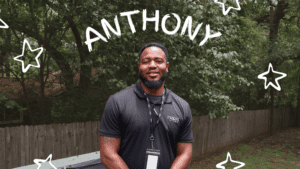
Meet Anthony: Front Steps Case Manager
This July, we’re highlighting Anthony, a dedicated Housing Case Manager whose passion for second chances and deep belief in people’s potential guide his every step. With a background in the justice system and a heart for service, Anthony brings compassion, consistency, and hope to those working to rebuild their lives. Keep reading to learn more about what drives Anthony, the challenges he’s faced, and the moments that remind him why this work matters.
Personal and Background:
1. Can you share a little about yourself and your professional background?
I am someone who’s deeply passionate about people and their potential. I believe in the power of second chances, growth, and the importance of uplifting others, especially those who have been overlooked or counted out. Professionally, I work in the juvenile justice and prison system, where I strive to be a source of support, accountability, and inspiration. My goal is to help individuals see that their past doesn’t have to define their future. I love seeking knowledge and passing that on in meaningful ways whether it’s through mentoring, education, or just being a consistent, positive presence. Outside of work, I’m all about balance. I love to work out, go fishing, play sports, and spend quality time with my family. These things help keep me grounded and remind me of what matters most. At the end of the day, I just want to help as many people as possible live better, stronger lives mind, body, and spirit.
2. What inspired you to join Front Steps and take on your role as a housing case manager?
What inspired me to join Front Steps and take on the role of a housing case manager was the opportunity to make a direct and lasting impact in the lives of people experiencing homelessness. I’ve always felt that my purpose on this earth is to serve to be a light in the lives of others, especially during their darkest moments. Being involved in helping the homeless community aligns deeply with my values and calling. Everyone deserves dignity, safety, and the chance to rebuild. In this role, I get to walk alongside individuals as they work toward stability, healing, and a fresh start. There’s nothing more meaningful to me than being part of that transformation.
3. How have your personal and professional experiences shaped your approach to supporting individuals experiencing homelessness?
Both my personal and professional experiences have deeply shaped how I support individuals experiencing homelessness. Working in the juvenile justice and prison system has shown me how cycles of trauma, poverty, and lack of support can lead people down difficult paths. It’s also shown me the power of compassion, consistency, and second chances. Personally, I’ve always had a heart for people. I genuinely care about seeing others thrive, no matter their background. I believe everyone deserves to be seen, heard, and given the opportunity to rebuild their life. My approach is rooted in respect, empathy, and meeting people where they are. I don’t judge their past I focus on their potential. At the end of the day, I see my role not just as a case manager, but as someone who walks beside others with encouragement and hope. My goal is to be a light in their lives, helping them believe in themselves and move toward lasting change.
Role Specific:
4. What excites you the most about being in this role?
What excites me most about being in this role is knowing that I’m part of a team of people who share the same heart and passion for helping others. It’s powerful to work alongside individuals who are just as committed to making a difference, who truly believe in investing time, energy, and compassion into those who need it most. There’s something really inspiring about being in an environment where everyone is working toward the same mission lifting people up, creating stability, and helping them take meaningful steps forward. That kind of shared purpose motivates me every day and reminds me why this work matters.
5. What’s a challenge you’ve faced in this role, and how did you work through it?
One of the biggest challenges I’ve faced in this role is seeing how deep and complex the issues surrounding homelessness can be—especially when someone is ready for change but the resources, timelines, or systems don’t move fast enough to meet their needs. It can be tough emotionally, because you want to do everything in your power to help, but sometimes the barriers—like lack of affordable housing, mental health support, or documentation—slow the process down.
What’s helped me work through this is staying focused on what I can do, being consistent, and building trust with the people I serve. Even when things move slowly, I know that being present, encouraging, and persistent can make a difference. I also lean on my team we support each other, share knowledge, and remind one another that progress, even when it’s small, is still progress. At the end of the day, I remind myself that this work is about people, not just outcomes. And every time someone takes a step forward no matter how big or small it reinforces why I do what I do.
6. Can you share a memorable success story or moment that captures the impact of your work?
One of the most memorable success stories for me was working with a client who had been chronically homeless for years and had experienced a lot of trauma and instability. At first, he was very guarded and didn’t trust the process—or anyone, really. But over time, just showing up consistently, listening without judgment, and helping him navigate small steps made a difference. Eventually, we were able to get him housed. I’ll never forget the moment he got his keys—he just stood there for a second, holding them in his hand, and then said, “I never thought this day would come.” It wasn’t just about a roof over his head it was about hope, dignity, and the start of something new. Moments like that remind me that this work matters. It’s not always easy, and it doesn’t always move quickly, but when someone turns the corner and begins to believe in a better future, it makes everything worth it.
Mission and Goals:
7. What part of Front Steps’ mission resonates with you and why?
The part of Front Steps’ mission that resonates with me most is the commitment to providing pathways home through shelter, housing, and supportive services. That word pathways really stands out to me, because it speaks to the journey each person is on. It’s not just about providing a temporary fix, it’s about walking with people as they work toward stability, healing, and hope. I believe everyone deserves a second chance and the opportunity to rebuild. Front Steps’ mission aligns perfectly with my own purpose—to serve others, to be a light in their lives, and to help them see their worth and potential. Being part of a mission that centers people, dignity, and long-term impact means a lot to me, and it’s what drives me to show up every day with compassion and purpose.
8. How do you see your work contributing to the organization’s goals and overall impact in the community?
I see my work as directly contributing to Front Steps’ goals by being on the front lines—building relationships, providing consistent support, and helping individuals move from crisis to stability. Every person I help get closer to housing, every barrier we work through together, is a step toward reducing homelessness in our community and advancing the organization’s mission. I understand that my role as a housing case manager is not just about services—it’s about creating trust, hope, and momentum for lasting change. When clients feel seen, supported, and empowered, they’re more likely to stay engaged and take the steps needed to succeed. That, in turn, strengthens the overall impact we have as an organization. By showing up with compassion, accountability, and purpose, I know I’m helping to build not just better outcomes for individuals, but a stronger, more connected community as a whole.
9. What are some hopes or goals for your time at Front Steps?
My hope during my time at Front Steps is to make a meaningful and lasting difference in the lives of the people I serve. I want to deepen my ability to support individuals experiencing homelessness not just by helping them find housing, but by being a steady source of encouragement, guidance, and hope as they rebuild their lives. I also aim to grow professionally, learning more about best practices, trauma informed care, and community resources so I can be as effective as possible in this role. Ultimately, I want to contribute to the organization’s mission in a way that helps create sustainable change not only for the clients but for the community as a whole. Above all, I hope to continue working alongside a team of passionate people who share the same commitment to serving others and lifting people up.
